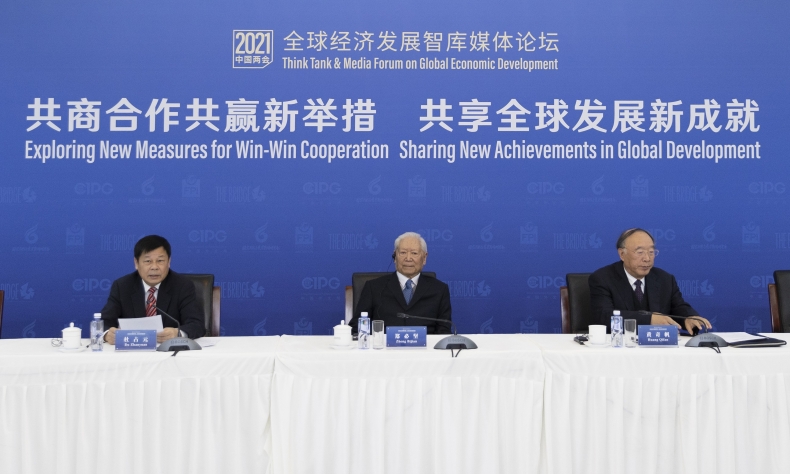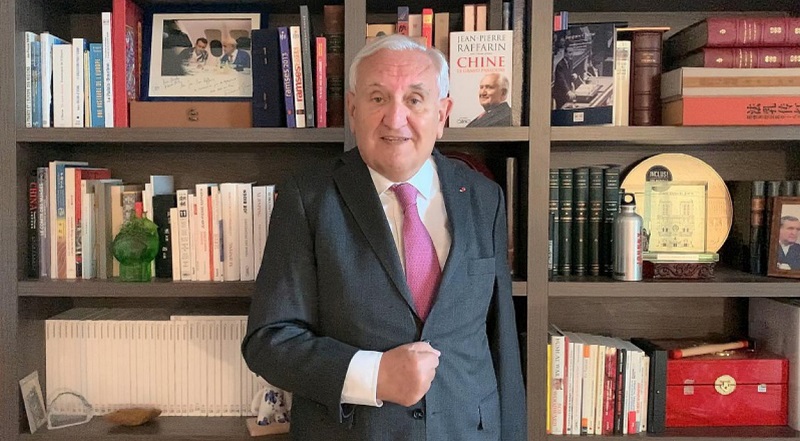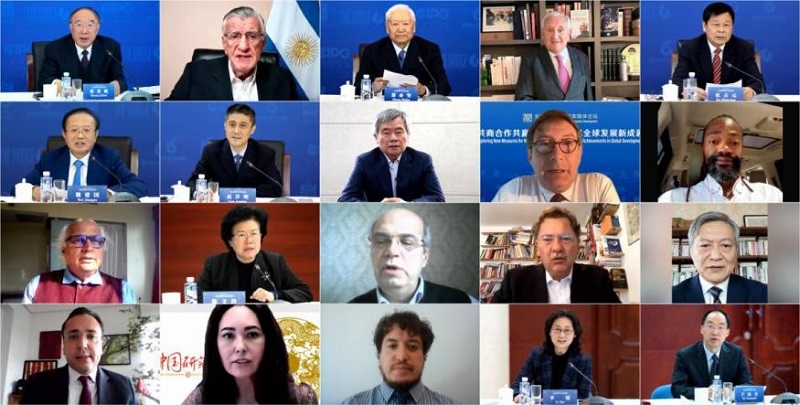Global Think Tanks Call for Win-Win Cooperation in Economic Development

There is a growing need for China to play a greater role in global governance and economic development.
On March 8, 2021, the Think Tank & Media Forum on Global Economic Development, co-hosted by China International Publishing Group (CIPG), China Institute for Innovation & Development Strategy (CIIDS), the Prospective and Innovation Foundation (Fondation Prospective et Innovation), and the Bridge Tank, was convened in Beijing. Taking as its theme “Exploring New Measures for Win-win Cooperation, Sharing New Achievements in Global Development” the forum brought together more than twenty dignitaries, experts, and media representatives from ten countries, including China, France, Russia, Kazakhstan, India, South Africa, Mexico, Argentina, Brazil, and Chile.
President of CIPG Du Zhanyuan, the former prime minister of France and chairman of the Prospective and Innovation Foundation Jean-Pierre Raffarin, president of CIIDS Zheng Bijian, and executive deputy director of the Academic Committee of CIIDS Huang Qifan each delivered a speech at the opening ceremony of the forum.
Du Zhanyuan pointed out in his speech that the global economy has seen great recession since the outbreak of the COVID-19 pandemic, and countries are calling for win-win cooperation and joint efforts to tackle the global challenges. In the post-pandemic era, the Chinese economy with its great resilience, is expected to be a driving force to push forward the global economic recovery. China’s new development pattern of “dual circulation” is poised to bring economic prosperity to both the country and the rest of the world based on extensive consultation and shared benefits. He stressed the increasing importance for members of the global community to resolve misunderstandings through exchanges and mutual learning, build bridges through win-win cooperation and reach consensus through cultural communication.

Raffarin indicated that world peace is our common goal. Only by deeper communication and exchanges can we understand each other better, which would then lead to world peace. He went on to emphasize that it is important to realize that economic development is the basis of global governance. In today’s world, no country can survive or prosper in isolation. Win-win cooperation, rather than unilateralism or protectionism, is the right choice, he pointed out. To tackle global challenges, he said that all countries need to strengthen cooperation in an innovative way to fuel up the world’s economy and improve the capacity for global governance.
Zheng Bijian said that a temporary resurgence of protectionism, unilateralism, and populism, and the wave of anti-globalization triggered by the pandemic, has brought uncertainties to the world. The once-in-a-century pandemic and new changes it has brought about have posed a great challenge to the international community. “However, if we take a look at the history of human society, we may discover that ‘greater cooperation’ will be achieved on a global scale after ‘great changes,’ and the undeniable trend today is still multilateralism rather than unilateralism, openness rather than seclusion, and cooperation rather than confrontation,” Zheng said.
To foster new opportunities in crises, Huang Qifan stressed the importance of win-win cooperation among countries and then put forward the following several suggestions: First, multilateralism is the key to building an open world economy; second, innovative cooperation must be carried out to boost the global economic recovery; third, international macroeconomic policy coordination is needed to improve the global economic governance system; fourth, the vision of building a community with a shared future for mankind must be incorporated into the tackling of global challenges.

During the discussion session, experts shared their views on specific subjects including effective measures for global economic governance, the practice of multilateralism for building an open and inclusive world economy, innovative cooperation to boost the economic recovery, coordination on international macroeconomic policies, the construction of an equal and efficient international division of labor system, and ways of discarding the Cold War mentality. A general consensus that everyone shared was that there is a growing need for China to play a greater role in global governance and economic development. They also emphasized the role of global think tanks in building platforms for dialogue as an important force in building a community with a shared future for all mankind.
 Facebook
Facebook
 Twitter
Twitter
 Linkedin
Linkedin
 Google +
Google +










